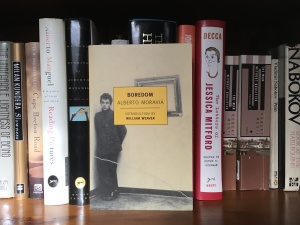In Rome in 1960, Everyone Drank Canadian Whisky
Alberto Moravia, Boredom (trans. Angus Davidson) (1960)
I suppose it would be glib to say that this novel induced in me the state alluded to in its title, but I’m afraid I did find it heavy going in certain stretches. Boredom is the story of a failed painter from a rich family who becomes obsessed with a young woman named Cecilia — they become lovers, but then he begins to suspect that she is having an affair with an actor, and that whenever she leaves his apartment, she goes straight to the actor’s. As part of this growing obsession, he takes to following Cecilia around and spying, first on the apartment building where she lives with her parents, and then on the actor’s apartment, hoping to catch her in the act, so to speak. In this passage he is sitting in a restaurant that has a large front window through which he can watch the entrance to the actor’s apartment building:
…the house in which the actor lived was framed in black marble and stood out against the white facade like an obituary notice on the page of a newspaper, but I immediately discovered that a bottle of whisky displayed in the window concealed at least half of it. It was quite possible that Cecilia might slip in or out of the house without my being aware of it, through the half of the door that I could not see. I tried moving my chair, but then I could not see the door at all because it was completely hidden by a large box of English biscuits. I wondered whether I could possibly put out my hand and remove the bottle; but I saw I could not do so without making the barman suspicious. In the end I decided to get rid of the embarrassing object by acquiring it. It was true that the barman might well have a similar bottle in reserve and would therefore not give me the one from the window, but I had no other means of achieving my aim. I called out: “I want that bottle there.”
He came over at once, a young, tough-looking man, thin and very pale, with one noticeable feature — a harelip which was ill concealed beneath a drooping black mustache. He asked, in a deep, confidential tone of voice, “The bottle of Canadian whisky?”
“Yes, that one.”
He bent forward, cautiously took the bottle from the window and appeared to be making a move to replace it with another standing near it. I said hastily, in a commanding voice: “Let me see it.” (202)
I apologize for such a long quote, but as you can see just from that passage, it sometimes takes Moravia a while to get to the point (by which I mean, in this case, the reference to Canada), and he seems to delight in recounting every little twist and turn in the thoughts of his narrator, who is characterized by a state of endless indecision and self-questioning. Just to relieve the suspense you are no doubt feeling, I’ll let you know that the barman then gets called away by another customer, and so does not replace the bottle, leaving our narrator free to observe the apartment building door unobstructed.
As for the Canadian whisky, I don’t think it has any particular significance here, nor do I think we can discern anything about Moravia’s ideas about Canada from it, beyond the fact that the country produces its own whisky, distinct from American varieties. It’s noteworthy that Canadian whisky would be for sale in a restaurant in Rome in 1960 — clearly the export business was doing well. But given the general description of the restaurant, it seems that, if anything, Canadian whisky represents a cheap type of liquor that would be available in lower-end places rather than, say, a classy choice that would be served at parties given by the upper crust of Rome society.
In terms of Moravia’s literary style, the decision to specify Canadian whisky does have a certain significance, in that it shows his interest in rendering everything he describes in the most precise detail possible. I’m not sure the scene would read any differently if the bartender simply said, “That bottle of whisky?” but telling the reader that it is Canadian whisky does add another layer of specificity to the moment, which contributes to the sense of a reality described at a very particular and, to use a horrible contemporary term, “granular” level.
The Proust Comparison
Finally, I’ll just add that this entire book reminded me of the portions of In Search of Lost Time in which the narrator is agonizing over the question of whether Albertine has been unfaithful to him, and he becomes obsessed with figuring out the when, where and with whom of her numerous affairs. I’m thinking mainly of the “Captive” and “Fugitive” sections (which are, of course, a repetition of the pattern of Swann and Odette’s relationship in Swann’s Way), which I have to admit are some of my least favourite parts of Proust, so perhaps that’s why this novel didn’t really appeal.

You’ve reminded me of this verse from Roxy Music’s “Mother of Pearl”:
Canadian Club love
A place in the country
Everyone’s ideal
But you are my favorita
And a place in your heart, dear
Makes me feel more real
I think I heard it for the first time when I was ten. In any case, I remember wondering about this Canadian Club, and imagining that it was a place in the country.
Thanks Brian. Curiously enough, there’s also a reference to Canadian Club in one of James Salter’s novels (written up here: https://wowcanada.wordpress.com/2015/11/04/salterall/)